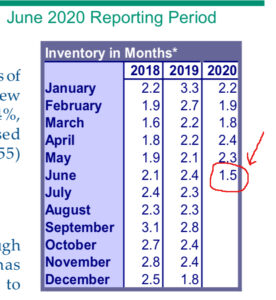Negotiations are a delicate dance, and it’s not about simply ‘splitting the difference’. In fact, I advocate for and employ strategies that ensure all parties get what they need. The baseline for any successful negotiation begins with establishing trust among all parties – your own clients, as well as the other parties in the transaction. It’s important to me that all my relationships are built on trust and clear, responsive communications. I believe that if I can provide these two things to my clients and the other parties in the transaction, I will be able to negotiate for my clients and influence the transaction in their favor, while also maintaining trust and integrity as a fair partner to the other parties involved.
While many aspects of the real estate business are becoming simpler and more consumer-friendly, most often due to technology developments (searching for homes online, signing documents electronically, the speed and ease of texts, .pdf files and emails, simple photo/video sharing, etc.), it’s still overall a complex and lengthy process involving large financial commitments and obligations, high levels of liability and exposure, timelines and milestones that must be adhered to rigorously, and, perhaps most importantly, human beings and their emotions, logic and passions.
While at first glance the human aspect may seem to be the most familiar of all of the pieces of the puzzle – after all, we live, work, negotiate and play with one another every day – dealing with the human emotions on both sides of a transaction can often be the single most challenging aspect for all parties: buyers, sellers, real estate brokers, mortgage brokers, and escrow officers. There’s no way around it: we’re a complicated species, with emotions that are dramatically heightened when we’re in the midst of high stakes transactions. Most buyers and sellers are dealing with the single biggest transaction in their lives, and that makes it very stressful and more difficult to manage expectations and emotions, and retain the ability to think through problems logically and reasonably.
And I love this aspect of the process! Not because people around me are stressed and worried, but because I’m able to bring forth a wealth of experience, skills and strategies for helping calm my clients, and the other parties involved, while at the same time consistently positioning my client for their ultimate success. I’m a passionate advocate and a skilled communicator. My law school training, and experiences as a practicing attorney, have prepared me especially well to negotiate for my clients in a powerful, effective manner. [Note: I am licensed in Massachusetts only, and do not represent my clients in any legal capacity…this is a bright line I cannot cross.]
Take for example one of the most delicate and important milestones in a transaction: the inspection contingency and repair addendum process. This is the moment when the sales agreement is essentially renegotiated to account for the findings from the home inspection, sewer scope, radon test and underground storage tank locates, as well as specialized contractors like plumbers, electricians, roofers and foundation specialists (to name but a few). There are always things that get called out even for the most scrupulous homeowner. Sometimes these things are minor, but often there are hidden deficiencies and defects that must be addressed – and will be requested by most reasonable buyers.
I often help my clients negotiate big, hairy, audacious repair addenda, including one that represented nearly 11% of the total sales price through a combination of seller credits, direct repairs, and sales price adjustments. That’s a big achievement – not only for my clients, but for all parties involved. Because ultimately everyone is getting what they want. Getting to that point of agreement is where the hard work really comes into play.
To me, the repair addenda process (and negotiations in general) can be distilled into a few simple principles:
- Build trust through earnest and clear communications and convey commitment to the transaction to the other party. In other words, “We love this house, care about this transaction, and aren’t simply going to walk away. Let’s figure out how to make this happen.”
- Provide facts and independent analysis — basically, show that you did your homework. Don’t simply ask for some random number — be able to make your case and show support for your claims.
- Be reasonable and stay focused on key items. Ultimately, this comes back to building and maintaining trust. Focus on key needs. The framework I adhere to, and work with my clients to adopt, is credited to a wise colleague at Living Room Realty and is focused on three key things: healthy, safety and structural repairs. The key word here is ‘repairs.’ This isn’t an upgrade addendum, it’s a repair addendum. Staying focused on those three things isn’t excessively limiting to a buyer, but it does show that they are simply insisting on repairs or credits for items that most reasonable and diligent buyers will also be asking for.
- Know when to flex, and know when to stand pat. This part is kind of like poker — know when to hold ’em and know when to fold ’em. Like poker, the crux is figuring out when the other party will budge and what their limits are. Not to say that any of this is a game, but similar psychology does come into play.
There are many more pieces to the real estate puzzle beyond the inspection contingency and repair addendum process. In fact, some of the most challenging transactions I’ve had are because of things that arose in the week or two prior to closing — something that had to be figured out among the parties, often with significant dollars involved, before the closing could occur. Those are more individualized in their nature, but the process for addressing them is the same. And by that point, hopefully the parties have built enough trust and are invested enough in the transaction that they become more willing to negotiate and make the compromises necessary to keep the deal together.
Simply put, I love to negotiate and enjoy the challenges and rewards of the process. Helping my clients realize a positive outcome is deeply satisfying for me.
And I love to see my clients achieve all of their goals, whether they are buyers or sellers. It’s an honor to be a trusted teammate and partner in their process, and I don’t take that honor lightly. My training as an attorney was to be a zealous advocate for my clients. I approach my relationships with my real estate clients in exactly the same manner, and I feel like it’s the right approach. Please read my client reviews, and see what they have to say.
We humans are a complicated lot and negotiations in a real estate transaction can be difficult, but by focusing on some basic principles and sticking to them even when the going gets rough, the results can be consistently and overwhelmingly positive.










 And in my absence, all was smooth sailing.
And in my absence, all was smooth sailing.





